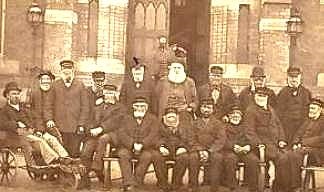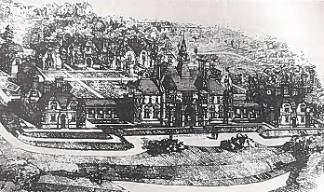- Topics
- Campaigning
- Careers
- Colleges
- Community
- Education and training
- Environment
- Equality
- Federation
- General secretary message
- Government
- Health and safety
- History
- Industrial
- International
- Law
- Members at work
- Nautilus news
- Nautilus partnerships
- Netherlands
- Open days
- Opinion
- Organising
- Podcasts from Nautilus
- Sponsored content
- Switzerland
- Technology
- Ukraine
- United Kingdom
- Welfare

Our serialisation of Pulling Together, the new history of Nautilus International, continues with the launch of the MMSA in Liverpool – still home to its successor union today
On Friday 3 April 1857 a 'very numerous attendance' of shipmasters, officers and owners met in Liverpool's Cotton Sale Room to consider the 'arbitrary and oppressive powers' introduced by the Merchant Shipping Act three years earlier – including a controversial tribunal system for wrecks at sea which one speaker at the meeting described as 'a gross injustice'.
Masters and officers considered that the courts of inquiry were impartial and 'incompetent through ignorance', with insufficient nautical expertise on the panels, and that they handed out excessively harsh penalties. Not only that, but masters and officers were denied the right of appeal against the findings.
Such a state of affairs, Captain Henry Ward (later to become MMSA president) told the inaugural meeting, was a national disgrace and meant that the system did not allow shipmasters and officers the privileges given to criminals.
The meeting, organised by local shipowner Ralph Brocklebank and Captain Charles Judkins of Cunard’s American Royal Mail Service, adopted two resolutions: one condemning the 'unjust' workings of the tribunals, and the other calling for the merchant service to be given a process in line with that of the Royal Navy, with charges to be considered by a 'tribunal of their own class'.
It was agreed that both these resolutions should be carried forward in a petition to Parliament.
The MMSA is born
But the meeting went much further than simple opposition to the tribunal system, with a succession of speakers talking about the 'moral and intellectual advance' of the men of the merchant service and of the need for 'a large and powerful body' to protect their interests. Those present unanimously approved a resolution calling for the formation of such a body – the Mercantile Marine Service Association – with the core aim of taking 'every legitimate step to elevate to their proper position the officers of the mercantile marine of the United Kingdom'.
Within a fortnight, the MMSA moved into temporary offices in Chapel Street, and its 40-member executive council published an appeal for all masters and officers of the mercantile marine service to join it, and support its aims and objectives.
Early action
The association rapidly set to work to address the ills identified in the founding meeting, creating the promised petition and continuing to lobby Parliament on the issue of tribunal system and to draw attention to individual injustices inflicted on seafarers.
It also set out to 'establish schools afloat and on shore for the education and training of boys and men for the service'. Acting with impressive speed, the MMSA managed within just two years to secure the loan of HMS Conway, a 26-year-old 28-gun frigate, from the Admiralty, and raised £1,200 to have the ship re-fitted as a school 'for the better training and educating of boys wishing to
enter and prosper in the mercantile marine service'.
Another early win was the Admiralty's approval in 1861 of regulations to enable 'commanders and officers of the Merchant Service' to be granted commissions in the Royal Naval Reserve, which had been established in 1859.
Within two years, MMSA membership rose to more than 1,000, and it dropped the words 'of Liverpool and the Western Ports' from its title as a sign of its intentions to organise on a wider basis. Within a year Liverpool MMSA had established a formal presence in the ports of Dublin, Cork, Belfast, Fleetwood and Whitehaven.
Mariners' Park
The MMSA was also always keenly aware of the unique welfare needs of seafarers. It set out to provide 'refuges and hospitals for aged, sick and worn out' seafarers and it played a crucial role in the creation of a Liverpool home to care for the orphans of merchant seafarers.
It also raised more than £12,000 for the creation of new Liverpool Homes for Aged Mariners. In October 1882 the foundation stone was laid for the main building at a 5-acre site on the banks of the Mersey, and in the following 95 years of its operation it accommodated a total of 1,113 residents.
By the turn of the 20th century the MMSA had managed to acquire further land to enable more houses, an infirmary and a home for widows to be built on what became known as the Mariners' Park Estate.
All this laid the foundations for a unique and specialist set of welfare facilities which evolved in the following decades under the supervision of the welfare branch committee.



Pulling Together - Nautilus history
Buy Pulling Together: The Making of a Global Maritime Trade Union, by Andrew Linington, online for £19.99 from the Nautilus Bookshop.
Tags
